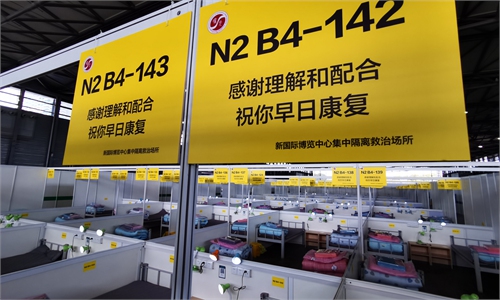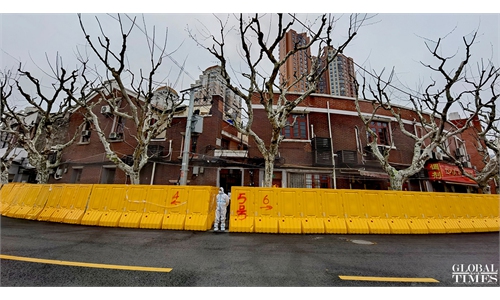
Residents line up to receive nucleic acid tests on Friday in Shanghai. The city entered a phased "pause" starting from Friday to April 5. Photo: VCG
Shanghai's Puxi on Friday entered a "pause," with its iconic landmarks such as the Bund, Nanjing Road Pedestrian Street closed temporarily; and mass COVID-19 nucleic acid screenings will be conducted for over 16 million residents covering 12 districts in the area within four days.
The financial hub has been in a decisive battling with a COVID-19 outbreak caused by Omicron. The city on Thursday registered 358 local COVID-19 cases and 4,144 local asymptomatic infections, the health authorities said on Friday. Of the local infections, eight confirmed cases and 3,710 asymptomatic cases were found under central quarantine.
From a livestreaming video by the local media, the well-known Nanjing Road Pedestrian Street has been put under a "pause," with its businesses on both sides of the street shut down during the closed-loop management, and a deliveryman carrying a large number of goods went through a street. Policemen are working in the field to maintain the order.
People's Park near the street was also closed, where there was a marriage market that parents of unmarried adults flock to during the weekend, but now the park is very quiet.
In an open residential community in downtown Huangpu district, residents were lining up in an orderly manner, with each other about one meter apart, to take nucleic acid tests on Friday.
"I have never seen Shanghai like this and I have mixed emotions," a 46-year-old local Shanghai resident surnamed Xu told the Global Times on Friday. "I was born here, and Shanghai is my hometown. I hope it will recover soon."
Shanghai conducted two rounds of mass COVID-19 nucleic acid testing in Pudong, Punan and other adjacent areas in four days starting from March 28, taking over 18 million samples. Preliminary data showed a decrease in the number of positive cases in the second round than in the first one, the local authorities said at Friday's press briefing.
Antigen testing is a very important supplement to nucleic acid tests. When nucleic acid detection capacity is insufficient, confirmed cases or potential patients can be found earlier and put under quarantine in time through antigen detection, and nucleic acid recheck will be carried out, Wang Guiqiang, director of the infectious diseases department at Peking University First Hospital said at Friday's press conference held by the State Council.
Antigen testing has played a very good role in Jilin, Shanghai and Hong Kong SAR amid Omicron outbreaks, Wang said.
More than 14 million residents in the city have taken antigen tests to screen COVID-19 infections, according to the authorities. But the results have not been released yet.
Jin Dongyan, a biomedical professor at the University of Hong Kong, told the Global Times on Friday that the Shanghai authorities and local experts may need some time to analyze the mass antigen test results to picture the epidemic situation.
The Hong Kong Special Administrative Region (HKSAR) government is also considering making use of rapid antigen tests to gauge the infection situation, Chief Executive Carrie Lam Cheng Yuet-ngor revealed at the regular coronavirus press conference on Thursday.
The HKSAR government has established a website for people who get positive results in rapid antigen tests to report the results. The government would also sample some of the people who have reported positive results to conduct nucleic acid tests for them for recheck.
Jin suggested Shanghai learn from Hong Kong's measures to set up similar reporting systems as some Shanghai residents are complaining on social media platforms that community workers just give them the antigen test kits, but have not told them what to do if they get positive results.
National Medical Products Administration has so far approved 19 COVID-19 antigen test products. The antigen detection reagent sensitivity is around 75%-98%, specificity in 95%-99% which means there could be possibly a certain proportion of false positives and false negatives, according to media reports.
As to concern over false positives and false negative results, Jin said that this would not be a big problem as the kits that have obtained the national authority's approval is of very high standard, nearly 100 percent, specificity and sensitivity.
For those who worry about false results, they can conduct tests in a consecutive five days to recheck the accuracy of the results, Jin suggested.
Shanghai authorities announced on Thursday night that starting Saturday, residents leaving the city are required to show a negative COVID-19 nucleic acid test taken within 48 hours and a negative antigen test taken within 24 hours. Nucleic acid and antigen test results will be checked at the city's airports, docks, railway stations and highways. For those who have a negative COVID-19 nucleic acid result taken within 24 hours, no antigen test result is required, according to Shanghai authorities.
As of Friday, 27 medical institutions in Shanghai have suspended certain medical services due to COVID-19 prevention and control, according to the health authorities. From April 5, a new digital health monitoring system called as venue code will be promoted citywide.


